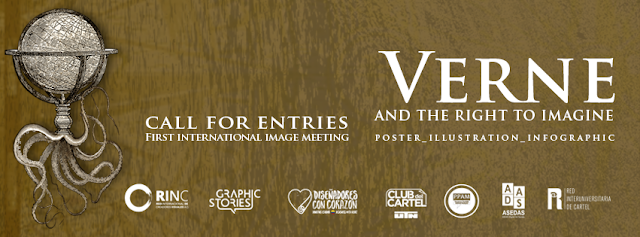Call for entries - "VERNE and the right to imagine"
"VERNE and the right to imagine"
Call for entries!
Social isolation leads us to moments of reflection, is when the concepts of search, exploration and travel become more valuable; these become introspection or selfrecognition. Taking these ideas into account, it is evident to think of Jules Verne; Legendary name within the creation of science fiction, the French writer who has made millions of readers travel "around the moon", to the center of the earth and 20 thousand leagues under the sea.
In the summer of 1839 the Verne family was preparing for dinner. But one member of the table was missing: little Julio, who was only eleven at the time. His father, angered by such disobedience, went looking for him. A sailor following him told him that he had seen two young men aboard the Coralie, a frequent ship in the port of Nantes. Pierre Verne boarded a steamboat that took him from Nantes to Paimboeuf, a village downstream before the mouth, a prestop for the Coralie before leaving for India ... yes, India. Pierre arrived just in time to meet his son and spank him. Julio, who dreamed of being a sailor, received the punishment in his house before all his family. And his father also punished him with a diet of bread and water and an oath that forced him to say. Then Julio repeated the father's words: "From now on I will only travel in dreams."
Famous for his fantastic adventure stories, always narrated in a tone of scientific credibility, in which he describes, with an almost prophetic vision, a multitude of scientific achievements, inventions and discoveries after his time. It would be worth rereading Verne to find another way to deal with our surroundings. It is possible to find the true desire to discover, to find what it means to be in the world.
He was considered the forerunner of a new literary genre: science fiction. He is the first author to make the scientist a hero in most of his books.
Chesneaux points out that Verne did not know about physics, chemistry, biology, and mathematics. To fill these gaps, he sought specialized advice and read scientific journals and news on topics that interest him. Verne collected around 25,000 cards with data that would help him write many of his novels.
"Earth does not need new continents, but new men."
For society to evolve into the future, we must change with it. Representative of creativity and imagination "Verne and the right to imagine" is the theme of the First International Meeting of Images, organized by: Rinc International Network of Visual Creators in association with: Graphic Stories Cyprus, Designers with a heart Ecuador and UTN Poster Club, ASEDAS Asean Digital Art Society, PPAM Animation Malaysia Educators Society and Interuniversity Poster Network, Mexico.
Poster:
A) Name of the participants:
Poster title
Specify in which SPECIAL INVITATION
Name of the author or authors (maximum three).
B) Full text of the proposal:
The full text includes research, reading of Verne's work, justification, creative process, conceptualization and design, as well as references. Maximum length of 300 words (not including references). Space and a half, in Arial 12 points. Use Microsoft® Word® or a compatible word processor.
The posters must be in vertical format and sent in two versions (JPG file of 30x20 cm at 150 Dpi in RGB) to be included in the Virtual Gallery www.rincrea.com and 100 cm high and 70 cm wide at 300 Dpi in JPG and CMYK format to print.
The reception of the works will be from the publication of the call until July 15, 2020 (deadline in which the works will be accepted).





Comments